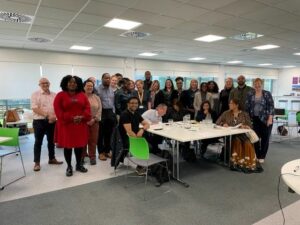Giving diverse leadership a boost
We’ve learned so much from a year of our programme to encourage ethnic diversity in leadership, and now we’re scaling up, writes Karen Mitchell, chief executive of Southway Housing Trust
Imagine coming to work feeling that you cannot be your authentic self.
This is one of the most striking findings to come from our early conversations with mentees who, in 2020-21, joined a pilot for Boost, a new ethnically diverse leadership programme for Greater Manchester Housing Providers (GMHP).
They told us that when they come to work, they leave their culture at the door.
In 2018, an Inside Housing survey showed that housing associations were overwhelmingly led by white people. Out of 64 surveyed, only three organisations were led by a chief executive from a Black, Asian or minority ethnic (BAME) background. In addition, only 4.5% of BAME staff were senior managers.
When we looked at the Greater Manchester picture, we faced the same problem. At that time, only one chief executive was from an ethnically diverse background: Cym D’Souza, the then chief executive of Arawak Walton Housing Association and current chair of BME National. We worked together to set up Boost with our academic partner, Julia Rouse, professor of decent work and productivity at Manchester Metropolitan University (MMU).
Boost launched to be a movement for change. It aims to challenge and address the underrepresentation of ethnically diverse colleagues in senior leadership roles in a nurturing environment that fosters an inclusive culture, removes barriers to progression and helps people achieve their career aspirations.
It works via reciprocal and disruptive mentoring. In its pilot year, 11 Greater Manchester housing associations, including Southway, were involved. Senior leaders paired with mentees from Black Caribbean, Black African, Asian and South American ethnic groups in other organisations.
 Initially, we had hoped that mentees could be teamed up with senior leaders from ethnically diverse cultures, but because of the deeply ingrained problem of underrepresentation, there was a lack of mentors with this background.
Initially, we had hoped that mentees could be teamed up with senior leaders from ethnically diverse cultures, but because of the deeply ingrained problem of underrepresentation, there was a lack of mentors with this background.
So, we had to start somewhere. In fact, it’s worked well, because mentors have learned a lot from their mentees, including gaining a better understanding of their experiences of workplace cultures that are predominantly white – and the power and privilege that being white can bring.
Mentors have invited their mentees to strategy sessions, board meetings and to observe conferences, to open people’s eyes to opportunities they might not have had before. It’s redefining the principle of allyship.
Change champions from each housing association are key and will look to implement actions from the programme, as well as delivering change projects within their organisations, engaging with senior leaders and promoting cultural change. Everyone involved in Boost joins our movement and our networking groups, attending events and discussions.
To add rigour and opportunities for learning, Professor Rouse helps to shape the programme and leads on research and evaluation. She brings a lot of passion and a wealth of experience in supporting organisations to improve people management. She is supported by Professor Dulini Fernando at Aston University.
As a result, Boost is now a three-year Knowledge Transfer Partnership (KTP) between MMU and GMHP with Southway as lead. MMU offers academic expertise and new skills to promote innovation, productivity and growth. The government-funded KTP (via Innovate UK) also allows us to have a dedicated project manager.
The programme has already seen some of our mentees moving into new roles and one of our mentors being promoted to chief executive. We have also agreed a common language to describe ethnically diverse colleagues, reviewed recruitment and selection policies, brought diversity into interview panels, introduced guaranteed interview schemes and anonymised job applications. We aim to create a safe space to have some of the more difficult conversations and agree actions.
 After the first year, with 15 partners involved and the graduation of its first cohort in June 2024, the project is scaling up. Twenty GMHP members are now part of the second cohort starting in September, and our aim is to have all 24 GMHP housing providers on board in year three.
After the first year, with 15 partners involved and the graduation of its first cohort in June 2024, the project is scaling up. Twenty GMHP members are now part of the second cohort starting in September, and our aim is to have all 24 GMHP housing providers on board in year three.
By the end of the third year, we will have a movement of over 200 people who have had direct involvement in Boost. With the support of executive leads from each organisation, the movement will continue to address underrepresentation and work towards the inclusive culture that we need, with the objectives and actions of Boost living well beyond the three-year funded programme.
People should not feel like they need to leave their culture at the door in any organisation. They should bring it with them, because it adds value and helps us to serve the ethnically diverse communities in which we work.
We want Boost to foster that inclusive culture and make everyone welcome with equal opportunities. We won’t fix this problem overnight.
We need this work to continue for years to come – not just in housing, but across the whole of society.
Since this article was published, Karen Mitchell has retired from Southway Housing Trust. Southway’s new Chief Executive, John Bowker, is now the project lead for the BOOST programme.
People should not feel like they need to leave their culture at the door in any organisation. They should bring it with them, because it adds value and helps us to serve the ethnically diverse communities in which we work.